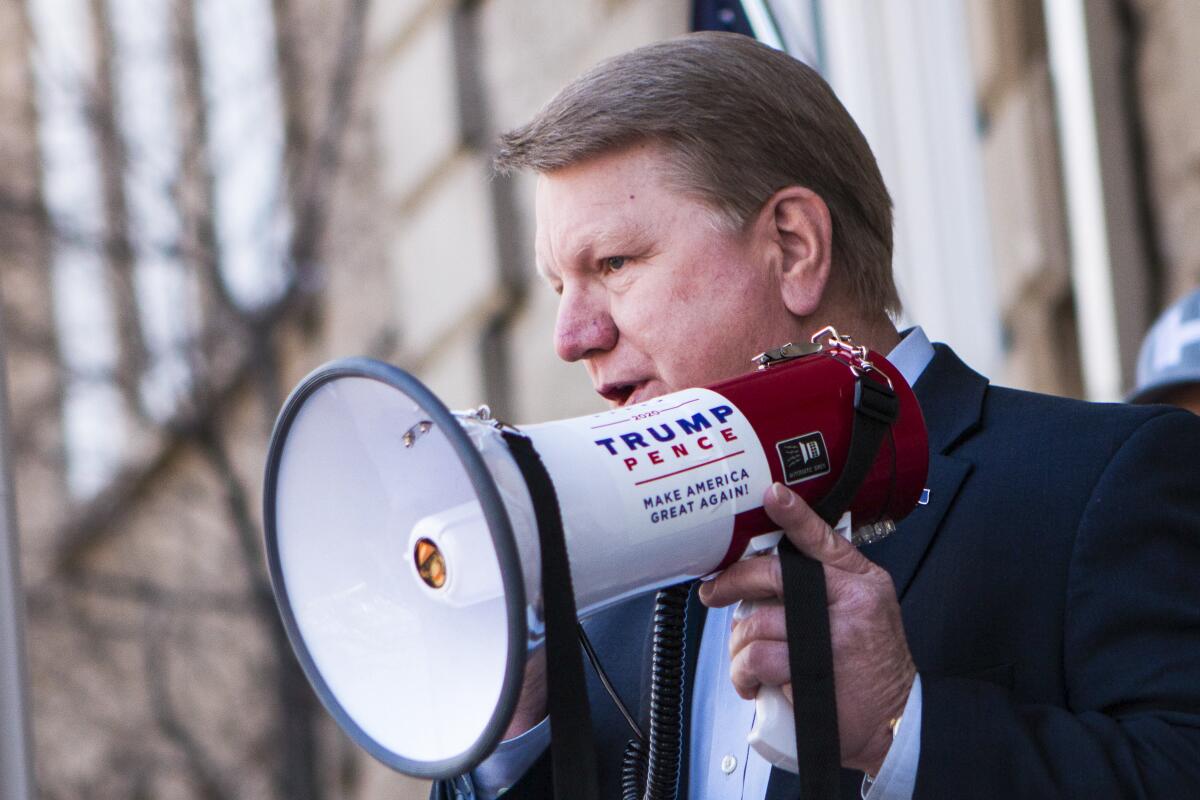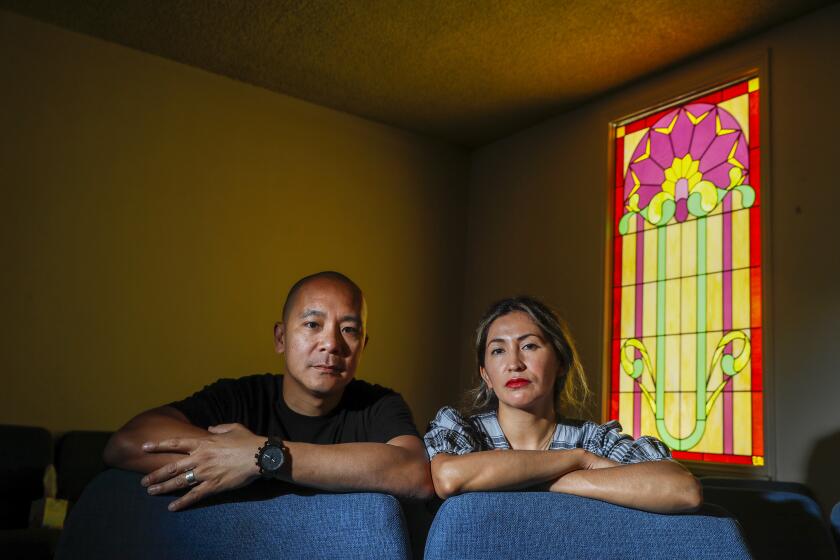Conspiracy theorists dominate GOP primary race for Nevada’s top election post

- Share via
RENO — Jim Marchant has been traveling the country repeating the false claims that the 2020 election was stolen from former President Trump and trying to make the case that electronic voting equipment should be tossed out in favor of ballots cast and counted by hand.
The businessman and former state lawmaker is on the primary ballot Tuesday in Nevada, a presidential battleground state. His goal is to become the state’s top election official.
Marchant is one of several Republicans across the country running to oversee the next presidential election while denying the outcome of the last one.
There is no evidence of widespread voter fraud or manipulation of voting machines in 2020. But the false claims have sowed doubt among Republican voters, triggered death threats to election officials and led to a host of new voting restrictions, mostly related to mailed ballots, in GOP-controlled states.
Nevada’s top election official, Secretary of State Barbara Cegavske, a Republican, has said repeatedly that she found no evidence of widespread voter fraud in the 2020 election. Term limits bar Cegavske from seeking reelection.
A Southern Baptist pastor on thinking, talking and praying about the recent sex abuse scandal.
Of the seven Republicans hoping to replace her, Marchant stands out for his rhetoric. He claimed during a February candidates forum that elections have long been corrupted.
“Your vote hasn’t counted for decades,” Marchant told the crowd. “You haven’t elected anybody. The people that are in office have been selected. You haven’t had a choice.”
Sparks City Councilman Kristopher Dahir — another of the GOP candidates for secretary of state — said he took offense to Marchant’s claim “because I think I actually got elected for real.”
Dahir told the Associated Press last week that he does not believe there was widespread fraud in 2020.
“I believe that I am the only candidate that is willing to accept the results but will work hard to make sure as a Nevadan there is not a reason to have questions surrounding this incredible right we have,” he wrote in an email.
Nationally, there are nearly two dozen Republican candidates running to be their state’s top election official who deny the result of the 2020 presidential election, according to States United Action, a nonpartisan advocacy organization tracking the candidates.
Among those who have advanced to the November election are Kim Crockett in Minnesota, Kristina Karamo in Michigan, and Audrey Trujillo in New Mexico.
Last month in Georgia, Jody Hice, who was endorsed by Trump, lost his bid to oust Secretary of State Brad Raffensperger in the GOP primary.
Raffensperger drew Trump’s ire after refusing a request to “find” enough votes to overturn President Biden’s win in Georgia.
Nevada — which Trump lost twice but where he remains popular among Republicans — is a top priority for the GOP this year, as the party looks to win a majority in the U.S. Senate.
Trump has endorsed his 2020 Nevada campaign chair, former state Atty. Gen. Adam Laxalt, in his effort to unseat first-term Democratic U.S. Sen. Catherine Cortez Masto. He has also backed Clark County Sheriff Joe Lombardo for governor.
Laxalt has repeated Trump’s lies about the 2020 election but faced criticism at a recent debate from one of his primary opponents for not doing enough to overturn the outcome.
“When President Trump, Nevadans and Americans were relying on you to be the one to challenge any sort of issues in the 2020 election, the only thing you did was file a lawsuit that, by your own admission, was late,” said candidate Sam Brown, a former U.S. Army captain who earned a Purple Heart in Afghanistan.
Laxalt said that as chairman of Trump’s Nevada campaign, he “sounded every alarm imaginable as the Democrats radically altered our election” and noted that it is the secretary of state, not the attorney general, who is responsible for investigating voter fraud in Nevada. For the 2020 election, mail ballots were sent to all registered voters — a temporary move that has since been made permanent.
Trump has yet to weigh in on the race for secretary of state, though he backed Marchant in his unsuccessful 2020 congressional bid. Trump also hasn’t made an endorsement for attorney general in Nevada’s Republican primary, a race between a pair of Las Vegas lawyers that has focused more on personal attacks than on concerns of voter fraud.
In the secretary of state contest, Marchant is not the only GOP candidate to question the integrity of elections and, specifically, the use of voting machines. At the February forum, candidate Socorro Keenan compared U.S. elections to those of countries “where they know how to cheat,” while Richard Scotti said he agreed with calls to do away with voting machines because “the data that they record in the evening is never the same in the morning.”
Another candidate, businessman and former state lawmaker Jesse Haw, has accused Democrats of changing voting rules to manipulate the system and called for voter ID requirements and new restrictions on mail ballots.
The claims appear to be resonating with GOP primary voters. At a rally in northern Nevada for Brown, the Senate candidate, several Republicans said they are convinced that Trump won in 2020 and that election integrity is a top concern.
Ingrid Lentz, 70, of Reno, said she believes there were “forces that were unseen” behind the 2020 election.
“I do believe the election was stolen,” added Ken Gray, chair of the rural Lyon County Board of Commissioners, who’s running for the state Legislature.
Charlie Fettig, a retired general contractor from Reno, said there were “a lot of illegal things done” in 2020, adding that he doesn’t have faith in drop boxes or voting by mail in general.
“It just opens it up for corruption,” Fettig said.
The federal government’s security experts declared the 2020 election “the most secure in American history,” Trump’s own attorney general said there was no fraud that would have altered the results, and more than 60 court cases have found no evidence to suggest that Trump was cheated out of a second term.
Outside money has been funding ads in the GOP primary for Nevada’s secretary of state. The Virginia-based political action committee Americans for Secure Elections, which has received $1.2 million from three groups that don’t disclose their donors, has been airing ads in support of Haw, according to the Brennan Center for Justice, which is tracking fundraising in these races. The PAC recently launched ads attacking Marchant, while another PAC has been airing ads in support of him, according to the Brennan Center.
On the Democratic side, lawyer and former Nevada Athletic Commission Chair Cisco Aguilar is running unopposed in the primary. In an interview, he praised the current secretary of state for taking steps to ensure a secure election and said he would build on work done by the Legislature to expand voting access.
He criticized the GOP field for spreading misinformation about Nevada’s secure voting methods.
“Unfortunately, we have a group of candidates that are looking to scare voters into action,” Aguilar said.
Election experts say candidates who repeat falsehoods and misinformation pose a danger if they get into a position to oversee elections. They might be motivated to interfere in the administration of elections or simply use their position to cast doubt on results.
“That person could create an environment of instability and doubt that is based on lies, and that instability could lead to political violence,” said David Becker, a former U.S. Justice Department attorney who leads the Center for Election Innovation and Research. “That is not a hypothetical, as we saw on Jan. 6.”
More to Read
Sign up for Essential California
The most important California stories and recommendations in your inbox every morning.
You may occasionally receive promotional content from the Los Angeles Times.










